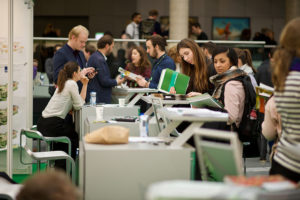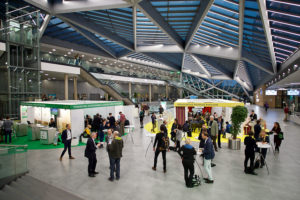With companies increasingly being seen as key partners in scaling-up efforts to achieve sustainable landscapes, a growing number of private actors are moving from ‘do no harm’ to a ‘do good’ approach.
In light of this, Tropenbos International (TBI) – along with the CGIAR Research Program on Forests, Trees and Agroforestry (FTA), the Netherlands Development Organization (SNV), Finance Alliance for Sustainable Trade (FAST) and the Forests and Farm Facility – organized a well-attended panel discussion titled “Inclusive Finance and Business Models – Actions for Upscaling” at the recent Global Landscapes Forum (GLF) in Bonn, Germany.
Held in the Finance Pavilion, where FTA and TBI also shared a booth showcasing their work and research, around 40 participants came together to hear from five panelists, share ideas about what a do-good approach means in practice, and consider how it can be scaled up.
Watch: Inclusive Finance and Business Models – Actions for Upscaling
In opening the discussion, TBI Director René Boot said: “There’s a growing need for companies and for investors to basically upgrade their corporate social and environmental responsibility policy. We think it is time to move from ‘do no harm’ to ‘do good’.”
Boot pointed out that in order to make that step, it is important to know how to build businesses that are both profitable and can contribute to livelihoods, secure land rights, and make use of the entrepreneurial qualities of smallholders and small and medium enterprises. “Do we have enough information, do we have enough examples, to scale up?” he asked.

The first speaker, Herman Savenije of TBI, presented the findings of a working paper titled Improving the positive impacts of investments on smallholder livelihoods and the landscapes they live in, a joint effort from the Dutch Development Bank (FMO), TBI, Dutch organization for development HIVOS and the Royal Tropical Institute (KIT).
The report “developed some key points for the do-good approach for investment and business,” Savenije explained. The points in the report were divided into three categories: recognizing rights; active engagement; and “think landscapes” – which is also an overarching focus of the GLF. An increasing number of business cases show that the approach is feasible, but requires thinking, acting and partnering beyond a business-as-usual approach, he added.
Savenije suggested that mainstream investments and businesses often ignore and underestimate land governance, land rights and livelihoods issues, but failing to properly address the issues could lead to business and reputational risks. “So strengthening the position of smallholders and communities within value chains, within landscapes, makes business sense,” he said.
Carina van der Laan of SNV then discussed access to finance for smallholders in oil palm plantations in Indonesia, while Marcelo Cardozo of the Bolivian forest producer organization MINGA provided perspectives from indigenous producers on accessing finance for integrated territorial management, Francesca Nugnes shared FAST’s experiences in supporting small- and medium-scale enterprises on building workable, sustainable business models, and Paul Hol of Sustainable Forestry Investments (SFI) discussed investments in tree plantations in Ghana and Tanzania.
Aspects of the session echoed a discussion organized by TBI in September, which showed that a growing number of investors want to have a greater positive impact on people’s rights and livelihoods in areas where they do business.
Read more: Getting down to business: Seminar promotes shift toward inclusive investment

Following the panel discussion at GLF, TBI and FTA produced a report outlining its outcomes.
“In the context of agricultural and forestry production, a do-good approach means that commercial investments simultaneously improve the environmental integrity of the landscape and the livelihoods of the people living there, while making a profit,” the report read.
“This requires long-term thinking and investments, including investing in stakeholder engagement and building relationships. Initially, this may result in higher opportunity costs, which makes such investments risky for the private sector. How then can a do-good approach be operationalized on the ground?”
Finding ways to operationalize this approach should be one of the main goals of related research – to advance understanding not only on which business models have greater potential for sustainability and social inclusion, but also on the most effective ways for financial institutions to support scaling-up efforts – which is embraced by FTA’s work on innovative finance, said Pablo Pacheco, a Center for International Forestry Research (CIFOR) scientist leading the work.
Those involved are convinced about the need to team up to reach scale. The success of a do-good approach, thus, is considered to be largely dependent on collaboration and connections. The panel discussion was another step forward in contributing to these efforts.
Read more:
- The success of do-good business and finance approaches will largely depend on collaboration and connections
- Doing good business: Scaling up investments that benefit smallholders and the landscapes they live in
By Hannah Maddison-Harris, FTA Communication and Editorial Coordinator
This work is linked to the CGIAR Research Program on Forests, Trees and Agroforestry, which is supported by CGIAR Fund Donors.











